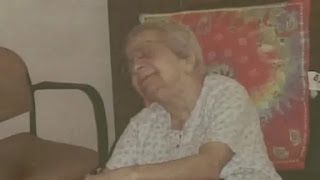Bonnie Lee Apple’s family knew she was not well.
Her
ex-husband had complained to Ms. Apple’s court-appointed guardian, who
has been in charge of her care since a 2018 aneurysm left her moderately
brain-damaged, that she had lost considerable weight.
Whenever
her twin sister went to her apartment on the Upper East Side of
Manhattan, Ms. Apple, 66, was covered in blankets or sheets. Health
aides said she was sleeping. When Ms. Apple’s 18-year-old daughter
visited in early February, she thought her mother was near death.
On
Feb. 12, a longtime friend who happens to be a doctor called to say
hello. “All she could say was, ‘I don’t feel good, I don’t feel good,’”
said the friend, Scot Silverstein.
He asked Ms. Apple’s health aide what was wrong. The aide texted a photo.
“She looked like she had just walked out of a concentration camp,” Dr. Silverstein said.
 |
| Ms. Apple on Feb. 12 of this year. Minutes later, she was rushed to the hospital. |
Ms. Apple’s emaciated face looked like skin pasted to bone; her arms were gaunt sticks.
Dr.
Silverstein called Ms. Apple’s ex-husband. The ex-husband called the
police. The police called an ambulance that took Ms. Apple to a hospital
where she remains six weeks later, suffering from complications that
Dr. Silverstein says were brought on by what was most likely months of
near-starvation.
On Thursday, Dr.
Silverstein and Ms. Apple’s sister, Amy Lee, are going to court to try
to strip Ms. Apple’s caretakers, the Guardianship Project of the Vera
Institute of Justice — a well-known legal-reform nonprofit — of control
of her affairs.
The hospital,
NewYork-Presbyterian/Weill Cornell, did not respond to a request for
comment about Ms. Apple. But Dr. Silverstein, who said the hospital had
shared limited information, said a doctor told him the day after Ms.
Apple was admitted that she was suffering from severe malnutrition.
Since
then, he said, batteries of tests and scans had found no underlying
illness that could account for his friend having lost about 40 pounds
since 2019. Medical records show that she weighed 135 in 2019 and 96
pounds in October 2021. Her weight upon admission remains unclear.
The Vera Institute, in a statement on
Wednesday, said, “The medical reasons behind Ms. Apple’s weight loss are
still being determined by medical professionals.”
While
guardians are required to file annual reports on their wards’ health
and financial status, Vera filed its most recent one, for 2019 — before
Ms. Apple started losing weight — on Wednesday, after receiving
inquiries from The New York Times. Vera declined to answer several other
questions about her case.
Vera said that Ms. Apple’s care was now being overseen by Project Guardianship Inc., an independent entity spun off from Vera’s Guardianship Project last year,
and that Project Guardianship was “investigating this matter
internally.” Project Guardianship said in a statement on Wednesday, “We
have worked closely with Ms. Apple’s physicians and the 24-hour home
health aides who provide direct care and assistance to Ms. Apple to help
her make decisions about her treatment and care.”
Guardians
can be appointed by the court system when someone cannot care for
themselves and no one else is both willing and able to do so; there are
about 13,000 people under guardianship in New York City, the state court
system said.
No city or state agency was able to
provide statistics Wednesday on elder abuse complaints involving people
under guardianship. But Elizabeth Valentin, a visiting associate
professor at New York Law School who specializes in elder law, said that
guardianship rules had “a number of gaps” in oversight mechanisms and
that “opportunities exist for negligence.” She added: “You only need one
or two people not doing their job and the whole thing falls apart.”
How
Ms. Apple ended up starving under the care of a guardian does not
matter, her family says. Ms. Apple’s case manager was supposed to visit
every month. Home health aides were with her around the clock, at a cost
to Ms. Apple, a former instructor at the Manhattanville College School
of Education, of more than $20,000 a month.
Ms.
Apple’s ex-husband, Gary Apple, said of the guardians, “If they looked
in it’s tragic. If they didn’t look in, it’s tragic. It’s no excuse.”
 |
| Ms. Apple with
her ex-husband, Gary Apple, last October. Mr. Apple wrote to Ms. Apple’s
guardian that she seemed “horrifyingly thin.” |
To this day, the family said, neither
Vera nor Project Guardianship has offered an explanation for how Ms.
Apple wound up in her condition. Vera remains legally in charge of both
Ms. Apple’s personal care and her finances.
For
the first week of her hospitalization, Dr. Silverstein said, the
hospital refused to let Ms. Apple’s family visit her or even get
information about her condition; he said the patient services department
told him that was on orders of the guardian.
The
lawyer Dr. Silverstein and Ms. Apple’s sister retained, Marcel
Florestal, said that in a recent conference, Vera’s lawyer indicated
that the organization would agree to step aside as Ms. Apple’s health
guardian but that it would seek to remain the guardian of her assets,
which as of 2019 amounted to more than $700,000, according to the report
Vera filed on Wednesday. In 2019, Vera received $9,375 in commissions
for managing Ms. Apple’s finances, the report said.
Vera
founded its guardianship project in 2005, in partnership with the state
court system, “in response to studies and news reports documenting
abuses by guardians,” according to Vera’s website, which promotes the project’s “highly regarded holistic guardianship services model” that includes lawyers, social workers and finance associates.
Ms.
Apple’s aneurysm left her with noticeable cognitive deficits and unable
to care for herself. But she remained animated and able to carry on
conversations, her family said.
By
last June, her ex-husband was concerned about her weight. He wrote to
Beth Williams, Project Guardianship’s main lawyer on Ms. Apple’s case,
that she “seemed exceptionally thin and frail.” Ms. Williams thanked him
for bringing the issue to her attention. On Wednesday, Ms. Williams,
who left Project Guardianship in October, said by phone, “I really don’t
remember having any correspondence with Gary about Bonnie’s doctors or
any weight loss.”
Ms. Williams said
that Vera had done a lot for Ms. Apple, including getting her piano
lessons and buying her a computer (with her own money). “Whatever she
wanted to do, we tried to use her resources to make her life as good as
it could be,” she said.
A report by a
court evaluator submitted Wednesday night in advance of Thursday’s
hearing recommended that a new guardian be appointed “since the actions
of the guardian” in managing Ms. Apple’s health “have been problematic.”
But
it also stated that the hospital’s investigation of Ms. Apple’s medical
and home care had found that “while certain decisions may have been
done differently, they did not conclude that the guardian had neglected”
Ms. Apple. It noted that Ms. Apple had been seen by a
gastroenterologist in November, but that “there was no resolution” on
why she was losing weight.
In
early February, when Ms. Apple’s daughter Josette visited her, she
stayed just a few minutes because it was so painful to see her mother so
ill and disoriented.
“I’d say
something and she wouldn’t respond,” or she would respond with
gibberish, Josette said. “She was like mumbling and yelling at the same
time.”
Josette added, “I knew that she
wasn’t getting out and I knew that she wasn’t really eating, but I
thought that had something to do with her condition, not the way she was
being treated.”
Since she has been
hospitalized, Ms. Apple has faced a series of problems, including blood
clots, gastrointestinal bleeding, anemia and unstable blood pressure,
Dr. Silverstein said.
Loss of appetite is not one of them.
“She’s like, ‘Where is my dinner’ when it’s breakfast time,” Ms. Apple’s sister said.






















